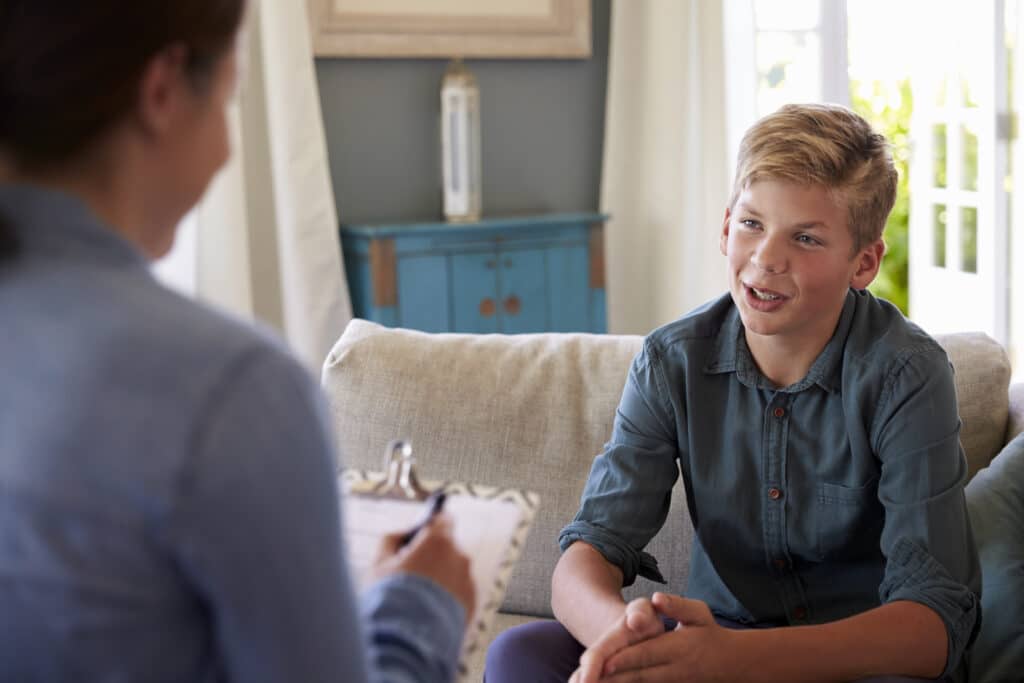COGNITIVE BEHAVIORAL THERAPY IN TEEN MENTAL HEALTH PROGRAMS

Cognitive Behavioral Therapy (CBT) is a structured, short-term therapy specifically designed to help teens and young adults identify and change unhelpful thoughts, behaviors, and emotional responses. With mental health challenges increasingly impacting youth, effective treatment options like CBT are more important than ever. As an evidence-based approach, CBT has become a cornerstone in treating conditions such as anxiety, depression, and childhood trauma. Its goal-oriented nature empowers teens to develop healthier coping mechanisms, leading to long-term improvements in their mental well-being. At Mission Prep, we integrate CBT techniques into our treatment programs, providing adolescents with practical tools to navigate life’s challenges.

MISSION PREP
Understanding Cognitive Behavioral Therapy (CBT)
Definition of Cognitive Behavioral Therapy (CBT)
Cognitive Behavioral Therapy (CBT) is a structured, time-limited psychotherapy designed to help teens identify and change unhelpful thoughts, behaviors, and emotional responses. At Mission Prep, we use CBT techniques tailored to adolescents, focusing on present challenges to empower them with effective coping skills. This evidence-based approach is proven to address various mental health issues, including anxiety, depression, and behavioral concerns, promoting long-term positive changes in teens' mental well-being.
Importance of Mental Health Treatment
With the global rise in mental health issues, especially among teens and young adults, the need for effective mental health treatments like Cognitive Behavioral Therapy (CBT) has never been greater. Conditions such as anxiety, depression, and behavioral disorders are becoming increasingly common in adolescents. Effective treatments like CBT therapy play a crucial role in addressing these concerns by providing structured techniques for managing unhelpful thoughts and behaviors. By offering a goal-oriented, evidence-based approach, CBT empowers teens to take control of their mental health, fostering resilience and long-term well-being. At Mission Prep, we recognize the growing importance of CBT in supporting teens through their mental health journeys.
Overview of CBT in Modern Therapy
Cognitive Behavioral Therapy (CBT) has become one of the most widely used evidence-based therapies for treating various mental health disorders, including anxiety, depression, and trauma. Its structured, goal-oriented approach makes it particularly effective for teens, helping them develop practical coping skills to navigate life’s challenges. At Mission Prep, we incorporate CBT into our programs to provide teens with the tools they need for lasting mental health improvements.
Cognitive Behavioral Therapy's Foundation
CBT Roots: Beck, Ellis, and Behaviorism
Outpatient mental health treatment at Mission Prep is designed to address a wide range of mental health conditions that teens may face, offering flexible care for both mild and moderate cases. Our programs support teens dealing with anxiety disorders, such as Generalized Anxiety Disorder and Social Anxiety Disorder, as well as those navigating depression, including Major Depressive Disorder and Persistent Depressive Disorder. Teens with more complex conditions like bipolar disorder, post-traumatic stress disorder (PTSD), and personality disorders (such as Borderline Personality Disorder) can also benefit from our outpatient services. We also provide care for teens experiencing adjustment disorders, helping them cope with stress from life changes, as well as those with ADHD and other mood or behavioral disorders. By offering a range of therapeutic interventions, our outpatient programs give teens the opportunity to manage their mental health while maintaining their daily lives, creating a path to recovery that’s adaptable to their unique needs.
Evolution of CBT
Cognitive Behavioral Therapy (CBT) began in the 1960s with Aaron Beck’s work on cognitive therapy, focusing on identifying and changing negative thought patterns. During the same period, Albert Ellis introduced Rational Emotive Behavior Therapy (REBT), emphasizing the impact of beliefs on mental health. Over time, CBT evolved by integrating cognitive therapy techniques with behavioral interventions, forming a structured, evidence-based approach. Today, CBT therapy is widely recognized for treating various mental health disorders, including anxiety, depression, and behavioral issues. At Mission Prep, we apply these CBT techniques to empower teens with effective coping strategies, promoting long-term mental well-being.
Milestones in CBT Research
Numerous studies and research have shown the effectiveness of Cognitive Behavioral Therapy (CBT) in treating mental health conditions. A landmark study published in the Archives of General Psychiatry found that CBT is as effective as medication in treating moderate to severe depression, with long-lasting benefits. Research on CBT for teens has shown significant improvements in anxiety and behavioral disorders, making it a preferred choice for adolescent mental health treatment. Studies on CBT therapy for conditions like post-traumatic stress disorder (PTSD) and obsessive-compulsive disorder (OCD) have further demonstrated its success in reducing symptoms and improving overall mental health. At Mission Prep, we utilize these evidence-based CBT interventions to support our teens in their recovery journey.
Core Principles of Cognitive Behavioral Therapy
Cognitive Behavioral Therapy (CBT) is highly effective in addressing mental health issues because it directly targets unhelpful thinking patterns that contribute to psychological distress. By identifying and challenging these thoughts, as well as the learned behaviors and problematic core beliefs that exacerbate them, CBT helps individuals adopt healthier coping mechanisms. This structured approach empowers teens to alleviate symptoms and build lasting mental resilience.
Cognitive Model
The foundation of Cognitive Behavioral Therapy (CBT) is the idea that thoughts, feelings, and behaviors are interconnected. Negative or maladaptive thinking patterns can lead to distressing emotions and unhelpful behaviors. By identifying and modifying these thoughts, CBT aims to change how individuals respond emotionally and behaviorally. This approach empowers teens to break the cycle of negative thinking, improving their mental health and fostering healthier coping mechanisms.
Behavioral Principles
Cognitive Behavioral Therapy (CBT) not only addresses negative thinking patterns but also incorporates behavioral techniques to promote healthier actions. Often, teens may avoid situations or activities that trigger anxiety or stress, reinforcing their unhelpful core beliefs. CBT interventions use techniques such as exposure therapy and behavioral activation to help teens confront and reduce avoidance behaviors. By gradually facing these challenges, individuals learn to develop healthier coping mechanisms, improving their emotional responses. This integration of cognitive and behavioral strategies is key to the effectiveness of the CBT model in treating conditions like anxiety, depression, and obsessive-compulsive disorder. At Mission Prep, we utilize these CBT techniques to support teens in building a more positive and resilient mindset.
Therapeutic Relationship
In Cognitive Behavioral Therapy (CBT), the collaboration between the therapist and patient is vital to the treatment's success. CBT is a structured, goal-oriented approach that relies on active participation from both the therapist and the teen. Together, they work to identify unhelpful thinking patterns, explore core beliefs, and develop practical coping strategies. This partnership fosters a sense of empowerment, as teens play a key role in their own mental health journey, learning to apply CBT techniques both in and out of therapy sessions. At Mission Prep, our therapists work closely with teens, building a trusting, collaborative relationship that encourages lasting change.
CBT Process and Key Techniques
Cognitive Restructure
Cognitive restructuring is a key Cognitive Behavioral Therapy (CBT) technique that involves identifying and challenging negative or irrational thoughts and beliefs. This process starts with the teen and therapist working together to recognize unhelpful thinking patterns, such as “I always fail” or “No one likes me.” Once these thoughts are identified, the therapist guides the individual in questioning their validity and exploring alternative, more balanced perspectives. By challenging these cognitive distortions, teens can develop healthier, more positive beliefs, leading to improved emotional responses and behaviors. This method empowers teens to use coping skills in real-life situations, reducing the impact of negative thinking on their overall well-being.
Behavioral Activation
Behavioral activation is a key Cognitive Behavioral Therapy (CBT) technique designed to increase engagement in positive activities to improve mood and reduce symptoms of depression. By using this CBT method, teens learn to identify activities that bring joy, fulfillment, or a sense of purpose. This approach helps counter the cycle of avoidance and inactivity commonly linked to depression. Through structured planning and goal-setting, teens gradually incorporate these activities into their daily routines, leading to improved mood and mental health. At Mission Prep, our therapists guide teens through this cognitive behavioral therapy technique, empowering them to develop healthier coping skills and break free from negative behavioral patterns.
Exposure Therapy
Exposure therapy is a Cognitive Behavioral Therapy (CBT) technique that involves the gradual and controlled exposure to feared stimuli to reduce anxiety. This method helps teens confront their fears in a safe and supportive environment, starting with less intense situations and slowly progressing to more challenging ones. By repeatedly facing these fears, individuals learn that their anxiety decreases over time, weakening the connection between the feared stimulus and the anxiety response. At Mission Prep, we utilize exposure therapy as part of our CBT approach, helping teens develop healthier coping mechanisms and gain confidence in managing their anxiety.
Mindfulness and Relaxations
Mindfulness and relaxation techniques are newer adaptations of Cognitive Behavioral Therapy (CBT) that focus on stress reduction and emotional regulation. Mindfulness-based CBT encourages teens to become aware of their thoughts and feelings in the present moment without judgment, helping them break the cycle of negative thinking. Relaxation methods, such as deep breathing exercises, progressive muscle relaxation, and guided imagery, are also incorporated to manage stress and anxiety effectively. These cognitive behavioral therapy techniques empower teens to calm their minds, reduce stress, and respond to challenging situations with a clearer perspective. At Mission Prep, our therapists integrate mindfulness and relaxation into CBT treatment plans, providing teens with a holistic set of tools for mental well-being.

CBT in Teen Mental health Programs
Outpatient therapy
In outpatient therapy, CBT is often used in one-on-one sessions to help teens identify and change negative thought patterns. Through structured techniques like cognitive restructuring and behavioral activation, therapists guide teens to develop effective coping skills for managing their mental health challenges. At Mission Prep, CBT in outpatient settings empowers teens with practical tools to address issues like anxiety, depression, and stress in their daily lives.
Inpatient and residential programs
In inpatient and residential programs, CBT plays a vital role in providing intensive support for teens with severe mental health conditions. Within these structured environments, therapists work closely with teens to identify unhelpful thought patterns, address core beliefs, and practice CBT techniques, such as cognitive restructuring and exposure therapy. This focused approach allows for continuous monitoring and personalized strategies, helping teens develop effective coping mechanisms. At Mission Prep, CBT is a key component of our residential program, guiding teens toward long-term mental health recovery in a supportive, therapeutic setting.
Group-based CBT programs
Group-based CBT programs offer teens a supportive environment to share experiences and learn from each other. These sessions provide a space to practice CBT techniques, such as cognitive restructuring and role-playing, while receiving feedback and encouragement from peers. This collective approach helps individuals realize they are not alone in their struggles, fostering a sense of community and reducing feelings of isolation. At Mission Prep, group CBT therapy empowers teens to develop social coping skills and gain diverse perspectives, enhancing their overall treatment experience
Online programs
Online CBT programs and teletherapy have grown significantly, especially during the COVID-19 pandemic. These platforms offer flexible, accessible support for teens, allowing them to engage in therapy from the comfort of their homes. Through virtual one-on-one sessions and interactive modules, teens can learn CBT techniques, like cognitive restructuring and mindfulness, to manage their mental health. At Mission Prep, we embrace online and telehealth platforms to ensure that quality CBT care remains accessible to teens, regardless of location.
CBT Treatment Timelines & What to Expect
The general length of stay for CBT treatments typically ranges from 8 to 20 weekly sessions, depending on the individual’s needs and goals. Short-term CBT may last around 8 to 12 sessions, focusing on specific issues like anxiety or mild depression. For more complex conditions, such as trauma or severe mental health disorders, treatment may extend to 20 or more sessions. The flexible nature of CBT allows for adjustments to the length of therapy, ensuring it aligns with the teen’s progress and treatment goals at programs like Mission Prep.
CBT typically involves 1 to 2 sessions per week, lasting about 45-60 minutes each. Most treatment plans span 2 to 6 months, depending on individual needs and therapy goals. For short-term concerns, therapy may last around 8-12 sessions over 2-3 months. More complex issues might require up to 20 sessions over 4-6 months. At Mission Prep, the duration and frequency of sessions are tailored to fit each teen’s unique situation, ensuring effective support and progress

A typical Cognitive Behavioral Therapy (CBT) treatment plan at Mission Prep might look like this:
Week 1-2: Initial Assessment and Goal Setting
The therapist conducts an in-depth assessment to understand the teen’s current mental health challenges, such as anxiety or depression. Together, they set specific, measurable goals for treatment. The teen is introduced to the basic concepts of CBT, including how thoughts, feelings, and behaviors are interconnected.
Week 3-6: Identifying Negative Thought Patterns
The teen learns to identify negative thinking patterns and core beliefs that contribute to their emotional distress. Techniques like thought records are introduced, helping them recognize and document automatic negative thoughts. Homework assignments involve tracking these thoughts between sessions.
Week 7-10: Cognitive Restructuring
During this phase, the teen practices challenging and reframing negative thoughts. The therapist guides them in developing more balanced and realistic thinking patterns. Behavioral activation techniques may also be introduced, encouraging the teen to engage in activities that bring joy or fulfillment.
Week 11-15: Skill-Building and Coping Strategies
The focus shifts to developing coping strategies for managing triggers and stress. Techniques like mindfulness, relaxation exercises, and problem-solving skills are practiced. If necessary, exposure therapy is introduced for conditions like social anxiety or OCD, gradually confronting fears in a controlled manner.
Week 16-20: Maintaining Progress and Relapse Prevention
The teen works on reinforcing positive thinking and behaviors learned throughout the sessions. The therapist and teen review progress, discuss strategies for maintaining mental well-being, and create a relapse prevention plan. Sessions may gradually decrease in frequency as the teen gains confidence in using CBT tools independently.
Follow-Up
After the structured plan, occasional follow-up sessions may be scheduled to provide ongoing support and address any challenges that arise. This ensures long-term success and continued use of CBT techniques in daily life.
Effectiveness of CBT in Teens
Research consistently supports the efficacy of Cognitive Behavioral Therapy (CBT) in treating various mental health conditions. Meta-analyses have shown that CBT is highly effective for disorders like anxiety, depression, and PTSD, often yielding better outcomes than other forms of therapy. Randomized controlled trials (RCTs) further confirm that CBT leads to significant symptom reduction in both short-term and long-term scenarios. Longitudinal studies also highlight CBT’s lasting benefits, with individuals maintaining improved mental health for years post-treatment. These findings underscore why Mission Prep integrates evidence-based CBT techniques to support teens in their mental health journey.
Cognitive Behavioral Therapy (CBT) has been shown to have lasting effects in maintaining mental health improvements and reducing relapse rates. Studies indicate that individuals who complete CBT are more likely to sustain positive changes in their thought patterns and behaviors, even years after treatment. For conditions like depression and anxiety, CBT not only alleviates symptoms during therapy but also equips individuals with lifelong coping skills that prevent future relapses. At Mission Prep, we emphasize these long-term benefits of CBT, empowering teens with tools to manage their mental health well beyond the therapy sessions.
Many teens at Mission Prep have shared how CBT has helped them overcome challenges such as anxiety, depression, and obsessive-compulsive behaviors. For example, one teen struggling with social anxiety found that CBT techniques, like exposure therapy and cognitive restructuring, helped them gain confidence in social settings. Another case involved a teen with depression who learned to identify and challenge negative thought patterns, leading to improved mood and daily functioning. These success stories highlight how CBT can empower teens to take control of their mental health and develop lasting coping skills.

KEY BENEFITS AND ADVANTAGES OF CBT
Structured and
goal-oriented
Cognitive Behavioral Therapy (CBT) is a time-limited and structured form of therapy, typically lasting 8 to 20 sessions. Each session is designed with specific objectives, allowing teens and their therapists to focus on targeted issues efficiently. This goal-oriented approach ensures measurable progress, making CBT an effective option for addressing mental health concerns in a relatively short period. At Mission Prep, we tailor CBT to meet the unique needs of each teen, setting clear goals to guide their therapy journey.
Skills for Life
One of the key advantages of CBT is that it provides individuals with practical coping strategies they can use long after therapy ends. Techniques like cognitive restructuring, mindfulness, and behavioral activation empower teens to manage future challenges independently. These lifelong skills not only promote resilience but also help prevent relapse, supporting long-term mental well-being.
Customizable to the Individual
CBT’s flexibility makes it adaptable to various mental health conditions and individual needs. Therapists can tailor the techniques to address specific concerns, whether it’s anxiety, depression, OCD, or PTSD. This customized approach ensures that therapy is relevant and effective for each teen’s unique situation. At Mission Prep, we personalize CBT plans to best support the diverse needs of our adolescent patients.
CBT COMPARED TO OTHER THERAPIES
CBT vs. Psychodynamic therapy
CBT is short-term and goal-oriented, focusing on changing thoughts. Psychodynamic therapy is longer and insight-based.
CBT vs. Dialectic behavioral therapy (DBT)
DBT, an offshoot of CBT, adds mindfulness and emotion regulation, helping with borderline personality disorder.
CBT vs. Humanistic Approaches
CBT uses structured techniques, while humanistic therapy is non-directive, focusing on self-exploration and growth.
How to find a CBT Therapist
Importance of Licensing
Always choose a licensed, state-certified therapist to ensure they meet professional standards for CBT practices.
Specialization Matters
Consider therapists specializing in areas like anxiety, depression, or teen mental health for tailored support.


The role of CBT in Modern mental health
CBT remains a cornerstone of evidence-based treatment, offering practical tools for lasting mental health improvements.
Final Thoughts
CBT is a valuable option for managing mental health, empowering individuals to improve their well-being.
Specialization Matters
Consult a mental health professional, like our team, to determine if CBT is the right fit for your needs.













